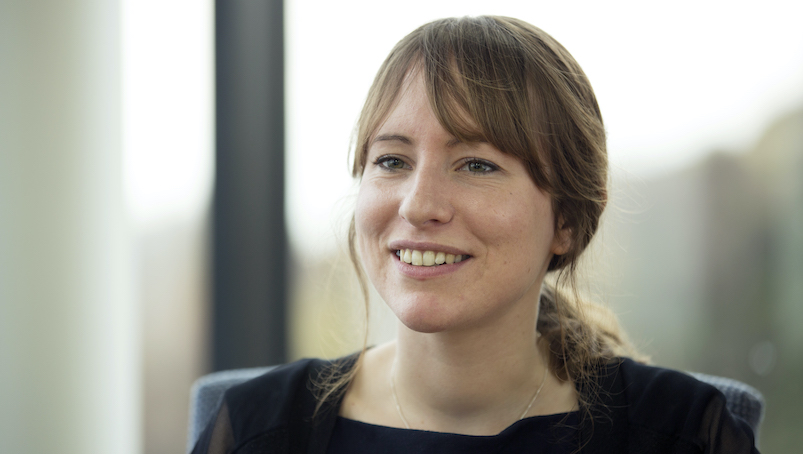Baillie Gifford China Growth trust manager Sophie Earnshaw is eyeing an “exciting” pipeline of private companies in China, while also playing up themes like the Gen Z consumer and healthcare innovation.
Since Earnshaw (pictured) and co-manager Roderick Snell took over the trust from Witan last September, it has undergone a radical transformation.
In addition to focusing solely on China as opposed to the broader Asia Pacific region, the trust invests in a slimmer number of 40-80 holdings, representing companies the managers believe will deliver “outstanding growth” in the next five to 10 years.
“For us, if you’re not looking for growth companies in China, you are kind of missing the point,” Earnshaw said. “We think China has some of the most exciting and transformational growth companies, not just in emerging markets but in the world.”
The £282.2m trust is similar to the open-ended Baillie Gifford China fund, also run by Earnshaw and Snell alongside Mike Gush, but has the added benefit of being able to employ gearing and to tap into companies further down the cap scale, as well as unlisted companies.
‘Unlisted holdings want us on their register’
As with other Baillie Gifford managers, including Scottish Mortgage leads James Anderson and Tom Slater, Earnshaw and Snell are finding some of the most promising growth opportunities in the private space.
Baillie Gifford is currently one of the largest overseas investors in China with £45bn invested in listed and unlisted equities. Its reputation in the region for being a long-term shareholder “typically means unlisted companies want us on their register,” Earnshaw said.
Baillie Gifford China Growth is able to invest up to 20% of its assets in unlisted companies. “Being able to invest in an unlisted capacity means you can access these businesses at much earlier stages of growth. The pipeline here as a result of that is really exciting.”
The pair bought their first private holding, TikTok owner Bytedance, last year. The video-sharing app, which also features in Scottish Mortgage and Monks Investment Trust, is currently 4% of the portfolio, making it the third largest holding behind Tencent (9.2%) and Alibaba (7.9%).
Founded in 2012 Bytedance has already become a “generation defining media company,” Earnshaw said, with its popular TikTok video app doubling revenues last year and hitting 1.9 billion active monthly users at the end of last year.
The company has invested a huge amount in research and development, particularly in AI and machine learning, Earnshaw said. “That has allowed them to continually innovate and bring out new applications, tailored to different media forms and different demographics.”
Generation Z
One theme Earnshaw is exploring in the portfolio in the consumer discretionary space is Generation Z.
Compared to millennial consumers who tend to buy “aspirational” multinational brands, Gen Z seems far more willing to use domestic Chinese brands, Earnshaw said, possibly because they grew up during a period when China has been “consistently on the front foot”.
“These younger consumers seem to be just very proud to be Chinese and want to express that by buying Chinese brands.”
One brand benefiting from this trend is Yatsen, a Chinese listed cosmetics company. Yatsen, which primarily sells online, harnesses the data it has on consumers to come up with new products and tweak existing ones.
“It’s been phenomenally successful so far,” Earnshaw said. “It has around a 3% share of the cosmetics industry in China, an industry that’s currently dominated by multinational brands.”
Another holding that fits the Gen Z theme is Bilibili, a Shanghai-based video sharing site aimed around anime, video games, comics and vlogging.
“It’s a site that seems to have proven very popular among younger consumers who I think maybe in a similar way to in the West, are wanting different online platforms than their older siblings or their parents.”
Chinese government encouraging drug innovation
Healthcare is another area Earnshaw is finding plenty of opportunities.
In addition to holding telemedicine firm Ping An Insurance, she also owns Burning Rock, which uses gene sequencing to determine the best drugs for cancer patients, as well as Tigermed, China’s leading clinical trial outsourcing company.
Tigermed derives a large chunk of its revenue from servicing big, multinational companies like Glaxosmithkline but Earnshaw adds it is also enabling smaller, biotech companies in China to focus on drug discovery.
“China has recently reformed what was called the CFDA, the equivalent of the FDA in China, making it much easier for innovative drugs to be approved,” Earnshaw said.
“With the fast-tracking process, and the government really encouraging domestic innovation, I think it’s only a matter of time before we start to see globally innovative drugs coming out of China.”







